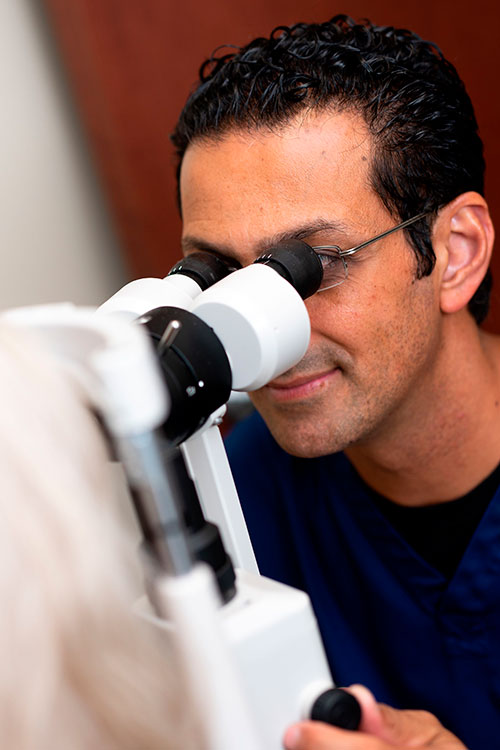
Cataract Surgery
At Ighani Eye Care, we do things a little differently; in a great way! And, trust us, we take “I Care. You’ll see” to a whole new level when it comes to cataract surgery. From diagnosis and consultation through to surgery day and post-op exam, we want your total experience to embody the genuine care and concern we have for you, your vision and your life.
Schedule Your Evaluation

Think you might
have cataracts?
You’re certainly not alone. Millions of Americans are living with cataracts, and millions more will develop them by age 65. Cataracts are, in fact, an inevitable part of aging. That means the more trips around the sun you get to take, the more likely it is you’ll develop cataracts.
But don’t let that fact worry you. At Ighani Eye Care, we want our patients to view cataract surgery as an opportunity! An opportunity to achieve restored vision, and regain confidence and independence as a byproduct.
But even beyond restored vision, the selection of a premium lens in conjunction with cataract surgery offers you the opportunity for improved vision and reduced dependency on glasses, contacts and even reading glasses! Ready to learn more?
SCHEDULE CATARACT EVALUATIONCataract Surgery FAQ
A cataract is a clouding of the eye’s natural lens that occurs as you age. This cloudiness blocks and distorts light passing through the eye, making your vision cloudy and blurry. Over time, the cataract will grow larger and cloud more of the lens.
You can think of the lens as a windshield of a car. If you drive that car long enough, the windshield will become dirty, and you’ll have a hard time seeing through it. This is because as light hits the windshield, it scatters, making it hard to see, especially at night with the light from oncoming traffic. The development of cataracts is a very similar process!
Symptoms can vary from person to person, but the most common symptoms of
cataracts include:
- Glare from headlights, lamps or sunlight
- Poor night vision, especially driving at night
- Cloudy or blurry vision
- Bright colors appear dull
- Halos around lights
- Frequent prescription changes in your glasses
- Difficulty reading in low light
Yes. Cataracts cannot be treated with diet and lifestyle changes or medication. And they will not improve on their own. Surgery to remove them is the only treatment.
We like to tell our patients that when their cataracts begin to negatively affect their life, it’s probably time for cataract surgery. If you are no longer able to enjoy the things you love, like golfing, reading, traveling or crafting, or no longer feel confident driving (especially at night), let’s talk.
Additionally, yearly eye exams allow us to follow and monitor the cataracts and are helpful in determining when to start talking to a patient about cataract surgery.
More than two million men and women just like you undergo cataract surgery every year, making the procedure one of the most common and successful medical procedures in the U.S. today.
During cataract surgery, you will be given a light anesthesia through an IV that will help you feel relaxed. Most people don’t remember the surgery once it is finished.
After the anesthesia takes effect, I will make a tiny incision to gently remove the cloudy lens and replace it with a clear artificial lens that is designed to last the rest of your life. The procedure is done one eye at a time and is virtually painless! You won’t be able to feel the new lens, and it can’t be seen. This new lens is designed to stay in your eye permanently. The entire procedure takes just a few minutes.
Surgery is typically performed one eye at a time, one to two weeks apart. This staggered approach allows your first eye to recover and your vision to stabilize before surgery is performed on the second eye.
There are two types of cataract surgery: traditional cataract surgery and laser-assisted cataract surgery. Both are straightforward outpatient procedures performed in just minutes. Both are generally safe and enjoy excellent success rates.
The most recent breakthrough in cataract surgery is the introduction of the cataract laser, and Ighani Eye Care is always at the front of the line where new technology is concerned! We are excited to offer FDA-approved laser technology for your laser-assisted cataract surgery procedure. Laser-assisted cataract surgery performs the critical steps of cataract surgery for us. It is more precise, more accurate, decreases risk, is FDA-approved to correct astigmatism that can even reduce your need for glasses.
Thanks to advances in technology, cataract surgery no longer requires a hospital stay or even stitches! We use a no-shot, no-stitch, self-healing technique, and recovery time is impressively fast. Everyone heals differently; however, if I perform your surgery on a Wednesday, 75% of my patients can return to work that Friday, and about 90% by Monday.
This is a great question, and the answer depends on your eye measurements and if you are a candidate for the different options. We customize a surgery plan for you at your cataract evaluation and let you know what options you are a candidate for. Some are covered by insurance, and others are not. Then you decide what fits your lifestyle.
If you choose standard cataract surgery with a standard monofocal lens, it’s likely you will still need glasses, contacts or even reading glasses afterward, depending on your current visual needs. But today, there are many cataract surgery options that can reduce or even eliminate your need for glasses after cataract surgery. In particular, the combination of laser-assisted cataract surgery and premium lenses can provide excellent outcomes and reduced dependency on corrective eyewear as long as you are a good candidate. We will go over all your options at your evaluation!
